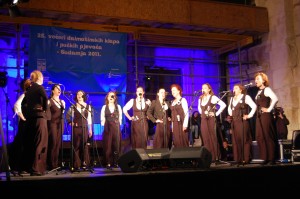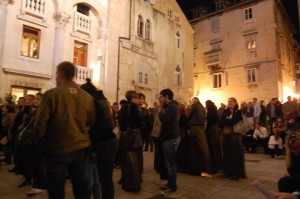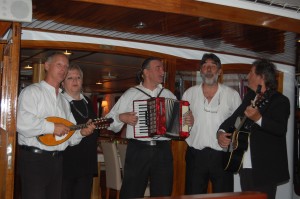
We arrived in Split two days before St Duje’s Day, and discovered to our delight that one of the festivities was a klapa concert. It was to be held in the peristil, the central collonaded area in Diocletian’s Palace. No fewer than sixteen different klapa groups participated, almost half of them women’s groups (until very recently, klapa groups were exclusively male). This was very definitely a concert by and for Croatians: the audience was mostly friends and relatives of the various groups.

It was also a lesson in local customs. The audience was supportive, but also talked freely during the music, and didn’t care about blocking the views of those sitting down on the side stairs (even ignoring other locals who were complaining to the standees in Croatian). Smoking? No problem: almost everyone smokes cigarettes in Dalmatia. We even saw pregnant women smoking.
Klapa is wonderful music, but it’s nothing like the Croatian music I’m most familiar with. Why is this? A glance at a map of Europe reveals dozens of small countries, but most of them are composed of even smaller regions with distinctive languages and traditions. Over my folkdance career I’ve learned many Croatian dances, but it turns out that almost all of them are from Slavonia, the northern inland area of Croatia bordering Austria and Hungary. Our vacation was in Dalmatia, along the south-eastern shore of the Adriatic Sea: just 150 miles from Slavonia as the crow flies, but a very different place. We think of Croatia as an Eastern European country, but Dalmatia has a very western feel, much like Italy. This is not surprising given that the Republic of Venice controlled and influenced Dalmatia from the middle Ages until the Napoleonic Wars. Italy also occupied several pieces of Dalmatia between the two World Wars. All of which explains why klapa sounds so pleasingly western to my ears. If the words were in Italian instead of Croatian, I would never guess that the music wasn’t Italian.

We were treated to a second, more intimate klapa concert while in KorÄula. Klapa Dalmacija, a group from the town of Vela Luka on the other side of the island, serenaded us during dinner. Later on, while they were having their own dinner, they kept singing. We bought one of their CDs and play it often as a reminder of our trip.